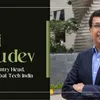We have to think local, and execute locally: McMillon
India is such a diverse market that it's not one country in some ways, said Doug McMillon, President and CEO of Walmart, at Converge@Walmart.
For Walmart Inc, India is the third largest market after the United States and China. It owns e-commerce marketplace Flipkart, which competes with Amazon in India, and digital-payment company PhonePe.
"India is such a diverse market (that) it's not one country in some ways," said Doug McMillon, President and CEO of Walmart, in a fireside chat with marketing professor Murali K Mantrala, at Converge@Walmart, a virtual conference on retail technology, organised by Walmart Global Tech India on August 25 and 26.
As per local regulations, Walmart cannot make a foreign direct investment in multi-brand brick-and-mortar stores, or sell its inventory directly to consumers. "We have to think local and execute locally, and it has its own rules. So, we've got to comply with those rules," McMillon said.
In June 2020, Flipkart bought Walmart India's wholesale business to support small- and medium-sized businesses in India. Walmart had acquired Flipkart in 2018. At present, the ecommerce marketplace has more than 3.5 million registered customers and 300,000 marketplace sellers.
"It's a very dynamic environment. Rules are changing, the customers are changing, competition is changing,” McMillon said, speaking of India’s fast-paced market. It “has its own uniqueness, which makes it exciting."
He emphasised on the importance of adjusting to change—an openness and readiness to change are crucial for older businesses to thrive in a dynamic future.
“The only things that are constant at Walmart are our purpose and values, and our associates will respond to change,” McMillon said.
Amazon has been giving tough competition to Walmart globally with its digital-first approach.
Walmart’s strategy in the past five years has been to double down on its omni-channel approach. In 2019, it appointed Suresh Kumar, who had previously worked at Amazon, Google and Microsoft, as its Chief Technology Officer and Chief Development Officer.
McMillon said the company is focusing on modernising some functions, and leveraging data to gain insights in more effective ways than before. It is changing by putting customer, product, business and technology at the same table across its businesses to enable faster movement, more innovations and designs with an outcome in mind.
“The thing that I've learned the most trying to help lead this change is that a digital transformation in the end is about people,” he reflected. Even with technology, data and its applications, and automation, “you actually have to change the mindset of how people have worked, and have them be willing to work in a different way, in a small team environment, to get a different outcome.”
McMillon sees a lot of potential to optimise and improve Walmart's supply chain, which is spread across apparel, merchandise and perishables, by using algorithms and robotics. The company can connect all those segments up to optimise the entire supply chain, while addressing sustainability and environmental concerns.
Edited by Kunal Talgeri







